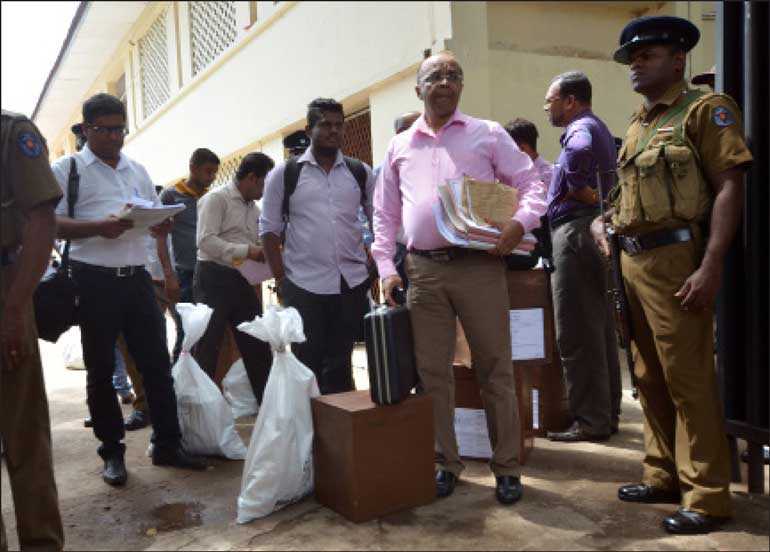Saturday Feb 21, 2026
Saturday Feb 21, 2026
Friday, 14 May 2021 00:00 - - {{hitsCtrl.values.hits}}

This exercise on ‘electoral reforms’ has to be conducted bereft of politicians for whom it will be a ‘conflict of interest’ as they are only ‘agents’ of the sovereign voters who are the ‘principals’ in keeping with the ‘law of agency’ – Pic by Shehan Gunasekara
 I was relieved to read an article in the press by the well-known good governance activist Chandra Jayaratne calling for effective participation of the National Election Commission (NEC) in ‘electoral reforms’ under the proposed new Constitution.
I was relieved to read an article in the press by the well-known good governance activist Chandra Jayaratne calling for effective participation of the National Election Commission (NEC) in ‘electoral reforms’ under the proposed new Constitution.
I was even happier to note that he has dwelt descriptively on two fundamental aspects of the General Election process viz. the formalisation of the ‘election manifesto’ and bringing political professionals to the Parliament as lawmakers.
I as a senior citizen having experienced our electoral process in practice for more than 56 years, have already submitted a comprehensive package of proposals to the ‘Experts’ Committee’ last year, inter-alia listing objective steps to bring about a simple, low-cost as well as a fair and democratic ‘electoral reforms’ aimed at meaningfully achieving the primary and the secondary objective of any election process which in Sri Lanka in its present form is erratic, costly, complex and laborious.
I fully appreciate the unstinting efforts of Jayaratne in designing a comprehensive ‘affidavit’ aimed at improving the quality of the candidates as well as that of the party ‘election manifesto’. Since I too have pressed on the need to give ‘legal teeth’ to the ‘election manifesto’, please permit me to deal briefly with some relevant aspects of my said package of proposals including the arithmetic of determining the number of seats won by the respective parties and the selection of political professionals as candidates to fill such seats.
Towards primary objective of accurately determining the number of seats won by each party
Apply simple proportionate arithmetic to district level valid votes of main contesting parties/alliances (excluding total votes categorised under ‘others’ and ignoring bonus seats and 5% minimum vote requirement), in order to ensure that every single valid vote will carry an equal value epitomising the basic requirement of any election by vote.
As a result, the real number of seats won by each contesting party/alliance in each district out of a predetermined total number of seats allocated for such district will be accurately determined. Based on changing district demographic data, delimitation exercises may be carried out as and when necessary.
Towards secondary objective of naming MPs to fill the number of seats won by each party
1) Abolish the much despised and corrupt ‘Preference Voting’ system. (The existing ‘optional’ nature of the ‘Preference Vote’ implies that this objective is secondary, justifying a measure of flexibility to the seat winning parties when naming their candidates.)
2) Devolve total responsibility to the contesting parties to fill their seats with political professionals according to their choice, from the registered list chosen by them from item 4 below.
3) Selection of genuine political professionals: When selecting such candidates, the contesting parties as corporate bodies governed by constitutions, should at the outset, be required to apply a robust set of eligibility and selection criteria laid down by the NEC in consultation with the line ministry and voters’ organisations such as PAFFREL, CAFFE and CMEV.
The first step in this direction was taken by PAFFREL in the form of the ‘March 12th Declaration’ in 2015. Now it is only a matter of improving on those criteria as and when necessary and legalising them as specific eligibility criteria for all candidates. In this regard, a non-exhaustive ‘citizen’s wish list’ by the writer titled ‘criteria for selecting election candidates’ was also published in the press some time ago and copies were sent to the concerned authorities.
The contesting parties shall be further required to hold structured interviews for eligible candidates also as laid down by the NEC, to select their final ‘merit list’ for each district. As a result, the hackneyed accusation that the party leader will select his ‘henchaiyas’ will not arise. Extra allocation of marks to ‘women candidates’ at pre-interview stage will ensure that they are placed high in the ‘district merit order’ list thereby helping to achieve the specific 25% for women representation.
This process needs to be made compulsory in the light of main parties outrageously continuing to field ineligible candidates with notorious records and backgrounds leaving a ‘Hobson’s choice’ to hapless voters to elect ‘horses’ from a list of proverbial ‘donkeys’! The filing of the stated sworn ‘affidavit’ by each candidate will no doubt buttress the aforesaid compulsory selection method which is the standard organizational procedure even to recruit a security guard. Towards this ‘paradigm shift’, the existing constitutional impediments if any, need to be removed.
4) With above system in place, the Elections Commission can relax its focus on the procedure for naming candidates as follows.
Certified names of the candidates listed as per one of the options proposed below (after reaching an all Party consensus on one option or as per the choice of the party concerned) shall be submitted to the authorities on the nominations date.
a) District wise list in ‘merit order’ as per the original system in 1978.
b) Electorate wise list to satisfy the proponents of the old ‘First-Past-the-Post’ (FPP) System. In this event, the party/alliance can assign more than one candidate to larger electorates of their choice to align with the 225 seat allocation.
c) Central pool of names as was adopted by the JVP up to recent times.
d) District wise list in ‘alphabetical order’ as done hitherto, but sans ‘preference vote numbers’.
Note: The parties should add a few more names at the bottom of their lists to meet any contingencies arising from death, expulsion and disability, etc.
5) The selection of 29 ‘National List’ members too should be subject to a compulsory set of eligibility criteria and a structured interview in keeping with its desired objectives and registered separately.
6) The parties can conduct their election campaigns based on the ‘election manifesto’ as well as on their selected candidates with emphasis on the optional list stated above.
7) The finances of the entire election campaign should be handled by the party head office as it takes ownership of its selected/ranked team members. As a result, ‘campaign financing’ can be better ascertained and monitored by the authorities.
8) The five-year party policy/election manifesto should be upgraded to the level of a ‘prosecutable document’ to prevent the incidence of false and utopian promises. The advent of such a legalised election manifesto will enable the voter to decide on his sole ‘X’ mark with much faith and confidence. Jayarane has very correctly dealt with this requirement in detail.
Other advantages of the proposed method
1) With the abolition of the ‘Preference Voting system’ the voter is simply required to mark only one ‘X’ against the relevant party symbol on the ballot paper, based primarily on the five-year Election manifesto and the ‘goodwill’ of such party and secondarily on the given candidate list. As a result, the rejected votes are bound to get reduced considerably.
2) The expenditure, time and energy spent by the Elections Department will drastically come down and the final election result can be announced by midnight.
3) Less affluent but well qualified candidates will not be required to finance their own campaign even within the limited area of an electorate.
4) The advent of a wise set of ‘genuine political professionals’ with a high degree of ‘common sense’ (consisting mainly of lawyers, accountants, economists and socio-political experts) who are best positioned to discharge the objectives and functions of a National Parliament, will send terms such as ‘unstable government,’ ‘hung Parliament’ and ‘two-third majority’ into the limbo of forgotten things.
Further comments
Since Jayaratne has dealt with the Parliament and Presidential Election together, please let me highlight some important deviations in my proposals with regard to the ‘election manifesto’.
1) Make the ‘executive president’ a non-partisan ‘statesman’ enabling him to cater to all citizens fairly and equally by speedily ‘executing’/ implementing the policies, election manifesto and the action plans of the incumbent government as per its approved national budgets. In my view, the zenith of a clean ‘executive presidency’ can only be reached by a contest among non-political ‘independent’ candidates conforming to a new robust set of eligibility criteria laid down by the NEC from time to time as enshrined in the Constitution. The present ‘2nd Preference’ vote available under the Presidential Elections becomes practical and meaningful only with ‘independent’ candidates.
2) To derive maximum cost-benefit for the country as well as to obtain rational election results from the voters, the Presidential Election and the National Election should be held on one specified day enshrined in the Constitution.
3) Similarly, it is rational that the Provincial Council Elections too be held on one legally specified day after effecting suitable amendments arising from these proposals.
Conclusion
In our view, for the foregoing to materialise, our ‘sovereign voter dedicated’ organisations like PAFFREL, CAFFE and CMEV should grab this final opportunity and convince the NEC to expedite the appointment of a ‘sovereign voter task force for electoral reforms’ comprising eminent retired judges and representatives of the aforesaid civil society organisations, good-governance academics and activists to study the report of the ‘Experts’ Committee’ and make their final submissions on ‘electoral reforms’.
It has to be emphasised that this exercise on ‘electoral reforms’ has to be conducted bereft of politicians for whom it will be a ‘conflict of interest’ as they are only ‘agents’ of the sovereign voters who are the ‘principals’ in keeping with the ‘law of agency’.
We are confident that the MPs as legislators led by the Prime Minister enjoying a two-thirds majority in the Parliament and the President as the Chief Executive of the country who values simple mechanisms and ‘out of the box’ proposals, will in their wisdom ensure the passage of these proposals under ‘electoral reforms’.
(The writer is a retired banker.)